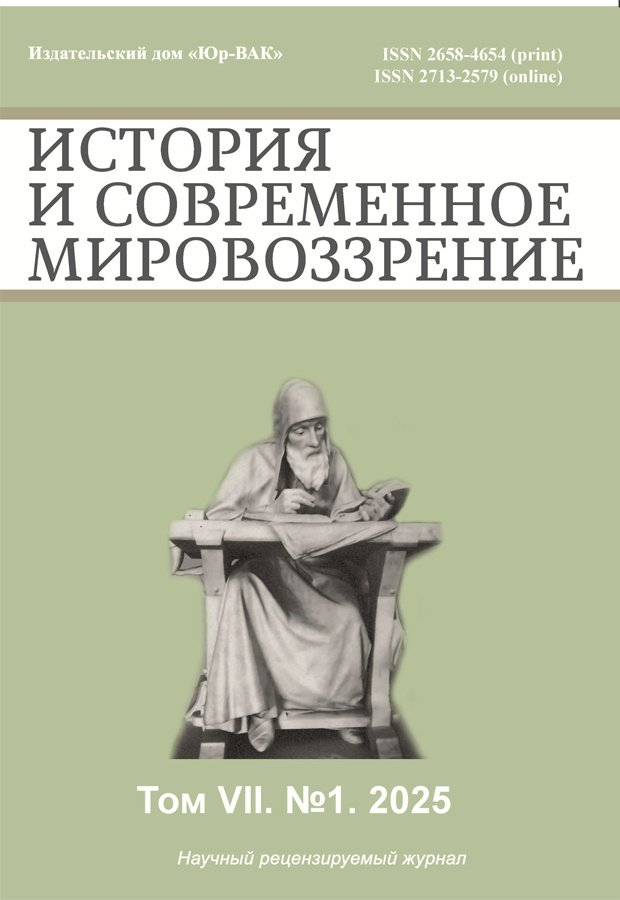Personnel policy of Russian electrical engineering companies at the turn of the 19th and 20th centuries (based on materials from the «Siemens and Halske» company)
- Authors: Borovskikh V.A.1
-
Affiliations:
- Peter the Great St. Petersburg Polytechnic University
- Issue: Vol 7, No 1 (2025)
- Pages: 107-113
- Section: SOCIOCULTURAL COMMUNICATIONS IN THE PAST AND PRESENT
- URL: https://journals.eco-vector.com/2658-4654/article/view/679563
- DOI: https://doi.org/10.33693/2658-4654-2025-7-1-107-113
- EDN: https://elibrary.ru/CVIMRY
- ID: 679563
Cite item
Abstract
Purpose of the research. The article examines the transformation of the personnel policy of electrical engineering enterprises in Russia at the turn of the 19th and 20th centuries. The purpose of the study is to examine the experience of «Siemens and Halske» in forming the personnel structure of enterprises and the system of motivation of skilled workers.
Results. The author comes to the conclusion that the history of the solution of the personnel issue at electrical engineering enterprises at the turn of the 19th and 20th centuries can be divided into two qualitatively different periods. At the first stage (1886–1898), the personnel of the management and production links was formed by inviting foreign specialists. At the second stage (1898–1917), a tendency towards «Russification» of both the management and production links appeared in the practice of forming the personnel. The German model served as a model for creating a system of motivation for workers at some enterprises in Russia. It was innovative for its time and demonstrated high efficiency. The social policy of the «Siemens and Halske» company in the 19th — early 20th centuries, although built on hierarchical principles, demonstrated a desire for targeted improvement of the professional level of personnel and improvement of working conditions, but never achieved complete social justice for all categories of workers.
Full Text
About the authors
Viacheslav A. Borovskikh
Peter the Great St. Petersburg Polytechnic University
Author for correspondence.
Email: slavaborovskih98@gmail.com
ORCID iD: 0009-0007-4589-1256
SPIN-code: 2542-1264
postgraduate student
Russian Federation, Saint PetersburgReferences
- Barkalov S.A., Kurochka P.N. History of project management in Russia. So they invented the radio, but there is still no happiness // Project management in construction. 2020. No. 3. P. 6–84.
- Bespalova S.V. Economic modernization of Russia in the late 19th — early 20th centuries. Moscow: Institute of Scientific Information on Social Sciences, Russian Academy of Sciences, 2014. 118 p.
- Bespalova L.N. Social policy of Otto von Bismarck // Bulletin of Altai State University. 2011. No. 4. Pp. 229–233.
- Bessolicyn A.A. Directorate of electrical engineering companies in pre-revolutionary Russia // Historia provinciae — journal of regional history. 2023. Vol. 7. No. 2. Pp. 437–486.
- Bessolicyn A.A. Personnel for modernization. Discussions on the training of specialists for the electrical engineering industry in Russia at the turn of the 19th and 20th centuries // Historical and economic studies. 2019. Vol. 20. No. 3. Pp. 366–395.
- Bessolicyn A.A. Management of electrical engineering companies in Russia in the context of economic modernization at the turn of the 19th and 20th centuries // Economic history: yearbook. 2021. Vol. 2020. Pp. 58–81.
- Bessolicyn A.A. Russification of management of electrical engineering companies as a factor in strengthening Russia's competitiveness at the turn of the 19th and 20th centuries // Bulletin of Volgograd State University. Series 3: Economy. Ecology. 2022. Vol. 24. No. 2. Pp. 49–62.
- Vishnyakov-Vishnevetsky K.K. Foreign entrepreneurs in the socio-political life of the Russian capital at the beginning of the twentieth century // Yaroslavl pedagogical bulletin. 2012. Vol. 1. No. 2. P. 29–35.
- Vishnyakov-Vishnevetsky K.K. Foreigners in the Industrial Life of St. Petersburg in the Second Half of the 19th Century: A Monograph. St. Petersburg: OOO Knizhny Dom, 2008. 168 p.
- Zhuravlev S.V. «Little People» and «Big History»: Foreigners of the Moscow Elektrozavod in Soviet Society in the 1920s and 1930s. Moscow: Russian Political Encyclopedia (ROSSPEN), 2000. 352 p.
- Ionichev N.P. Russia's Foreign Economic Relations (IX — Early XX Century). Moscow: Aspect Press, 2001. 399 p.
- Lypka T.I. Social policy at industrial enterprises of Germany (second half of the 19th — beginning of the 20th century) // Bulletin of the Vyatka State University. 2016. No. 8. Pp. 51–57.
- Potkina I.V. Firm Development Strategies: Production Modernization Practices and Investments in Human Capital // History of Science and Technology. Museum Science. Periodic Table of Technologies: Human Factor. 2020. P. 202–208.
- Simonov N.S. Development of the electric power industry of the Russian Empire: the prehistory of GOELRO. M.: Dmitry Pozharsky University, 2016. 302 p.
- Ulyanova S.B. «The Capitalists' Trade Union: The St. Petersburg Society of Factory Owners and Manufacturers in 1906–1914». St. Petersburg: Nestor, 1997. 131 p.
- Heller K. Public opinion, Moscow entrepreneurs and the «German dominance» in Russia during the First World War // Russia during the First World War. 1914–1918: Proc. Int. scientific conf. (Moscow, September 30 — October 3, 2014) / ed. Moscow: [IRI RAS], 2014. Pp. 238–244.
- Heusler I. Cooperation of A.S. Popov with the firms «Telefunken» (Berlin) and «Siemens and Halske» (St. Petersburg) as an example of business ties between Russia and Germany in the field of electrical engineering // Bulletin of ETU LETI. 2004. No. 13. P. 40–42.
- Shilnikova I.V. Foreign specialists at Russian enterprises: hiring conditions in the late 19th — early 20th centuries // Historical and economic studies. 2009. Vol. 10. No. 2. P. 25–42.
- Feldenkirchen W. Werner von Siemens. Lebenserinnerungen. Munchen, 2008. 528 s.
- Kobrak C., Schneider A. Varieties of business history: Subject and methods for the twenty-first century // Business History. 2011. Т. 53. № 3. P. 401–424.
Supplementary files









